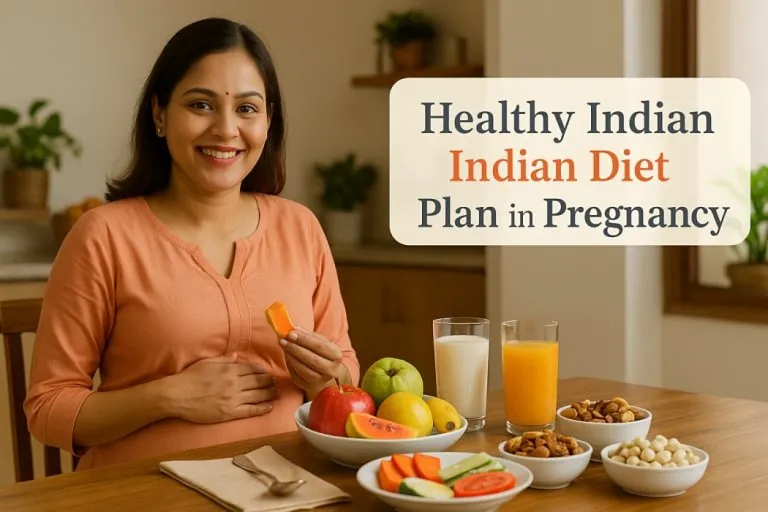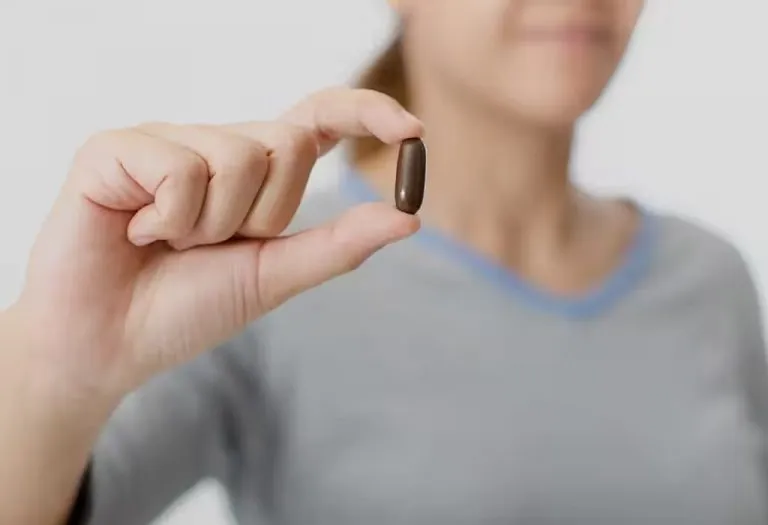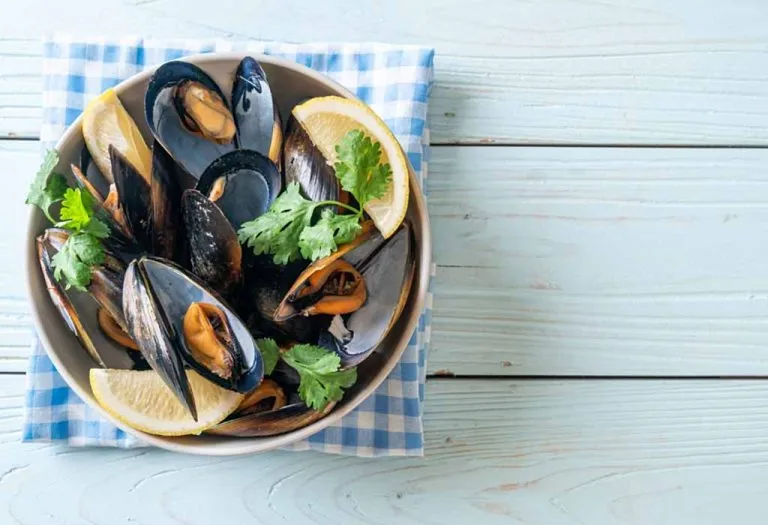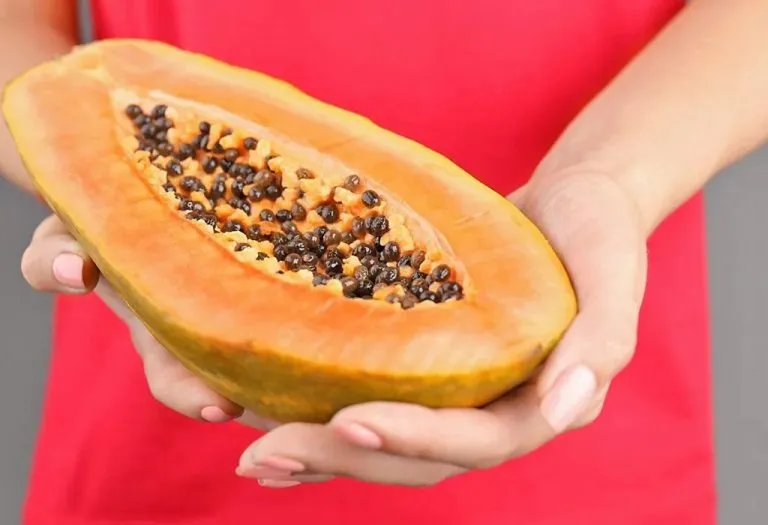Seventh Month Pregnancy Diet – Foods to Eat and Avoid
- What Foods Should You Include in Your Diet in the Seventh Month of Your Pregnancy?
- Foods to Avoid in the Seventh Month of Pregnancy
- Dietary Tips for Seven Months Pregnant Women
- FAQs
You are in the third trimester of your pregnancy, which is the last leg of your pregnancy journey, and you are slowly inching to the most awaited day of your life. Your body and your baby are going through tremendous changes. To ensure that your pregnancy progresses just fine, you need to maintain a healthy diet. You will need to structure your diet in a way that will work around the needs of your nutrition at this stage and also keep a check on your weight. Your stomach with rumble more than often as your baby is now preparing for its life once it is outside.
Health experts recommend that at least an additional 450 calories to ensure that your baby gains from nutrition needed at this stage. So, the big question is what should you eat to strike this balance between nutrition and weight control? There are plenty of options – read on to find out about a diet plan for a 7-month pregnancy!
What Foods Should You Include in Your Diet in the Seventh Month of Your Pregnancy?
A healthy third-trimester diet during pregnancy has many elements. Your pregnancy diet plan can comprise all the essential nutrients and you must eat in moderation. Avoid overeating because you will feel severe hunger pangs during this period. Here’s a 7 month pregnancy food chart where you’ll learn more about what foods to eat during the 7th month of pregnancy.
1. Foods Rich in Iron and Protein
Your body will need an extra dose of iron in the third trimester of your pregnancy to prevent anaemia or haemorrhage during delivery or even premature delivery. You would need approximately 27 mg of iron every day (1). Dark green vegetables like spinach, turnip leaves, dried fruits like raisins and apricots, pumpkin and sesame seeds, soya beans, red meat and poultry are all iron-rich foods that you can include in your diet. Protein is also important for the healthy growth of the baby. The amino acids present in protein-rich foods like eggs, meat, lentils, chickpeas, pulses and dairy products will provide you with the recommended 75-100 gms of protein a day.
2. Foods Rich in Calcium
Intake of calcium in the third trimester of pregnancy is considered very crucial as eating calcium-rich foods will aid in the healthy development of your baby’s skeletal system and a robust bone structure (2). You must aim to get 1000 gm of calcium every day through your diet. You can include dairy products like milk, cheese, paneer and yoghurt as they are rich in calcium.
3. Foods Rich in Magnesium
Along with calcium, you will also need magnesium in a proportionate amount in order to assimilate the calcium. Magnesium will help alleviate leg cramps, relax muscles and also prevent premature delivery (3). You need 350 mg of magnesium daily while pregnant. You can include black beans, oat bran, barley, artichoke, almonds and pumpkin seeds in your diet, as they are rich sources of magnesium.
4. Foods Rich in DHA
A fatty acid, DHA is essential if you want a child with brains and brawns. A daily intake of 200 mg is recommended for the development of the baby’s brain. Fish oil, fatty fish like tuna, walnuts and flax seeds are some foods loaded with DHA – so include these in your pregnancy diet (4).
5. Foods Rich in Folic Acid
Folic acid lowers the risk of any neural tube defects and aids in the development of a healthy neural system. Make sure you get at least 400 mg of folic acid daily through your pregnancy diet (5). You can eat dark leafy vegetables, oranges, oatmeal, whole grain bread and fortified cereals to get the recommended dose of folic acid.
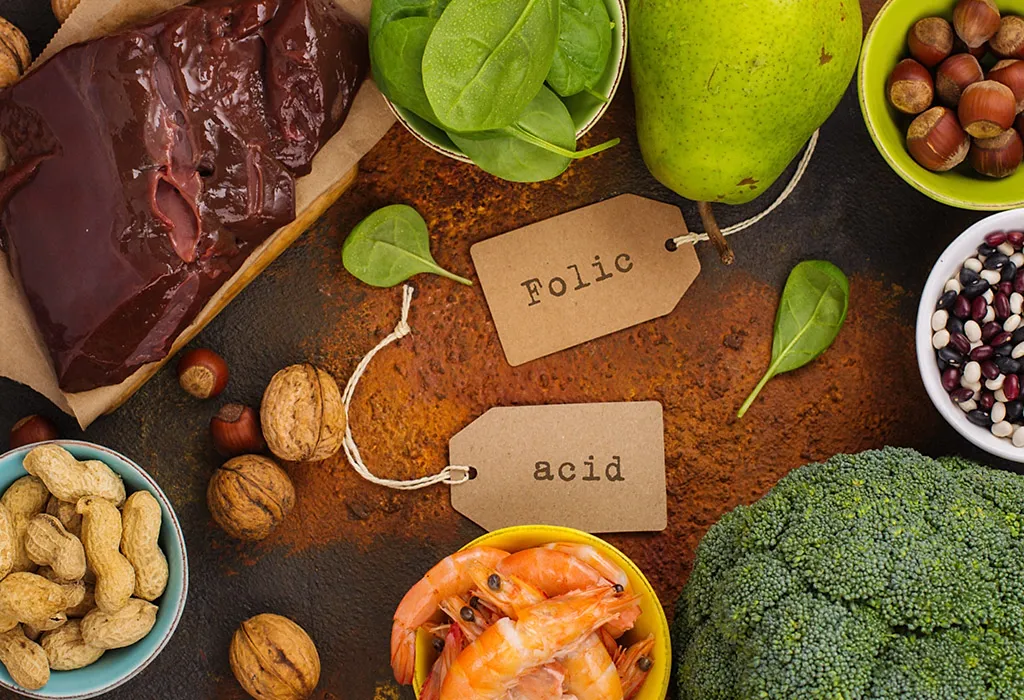
6. Foods Rich in Fibre
A fibre-rich diet can help clean the bile and prevent constipation. The water in your digestive tract is absorbed by your fibre intake so make sure you drink lots of water. Constipation is common in the third trimester so include, fresh fruits and vegetables, legumes and whole grains in your diet.
7. Foods Rich in Vitamin C
Increasing your intake of Vitamin C will help in the proper absorption of iron during pregnancy. Citrus fruits like lemons, oranges and melons, green pepper and broccoli are rich sources of Vitamin C.
Foods to Avoid in the Seventh Month of Pregnancy
Just when you know what to eat, bear in mind it is equally important to know what not to eat during this stage. Heartburn, swollen feet and hands, fatigue and constipation, are some common problems that you might experience during this stage of pregnancy. Eating certain foods will certainly aggravate these issues, and it is better to eliminate them from your diet.
1. Spicy and Fatty Foods
Foods high in fat and spice, especially fried food will increase the discomfort of heartburn. They are difficult to digest and may hinder your sleep. Avoid eating fried foods at night.
2. Foods High in Sodium
It is important to keep a check on your sodium intake at this stage of pregnancy. High intake of sodium will lead to swelling and bloating. Avoid crisps, pickles, sauces, canned food and ketchup. Drink plenty of fluids and water to regulate your sodium levels in your body.
3. Caffeine and Fizzy Beverages
Coffee and tea should be completely avoided during pregnancy. But if you want to drink them, restrict yourself to just one cup a day as it could lead to constipation. Fizzy drinks are loaded with artificial sugar and sweeteners and provide absolutely zero nutrition, so they are best avoided.
4. Alcohol
Alcohol is definitely not recommended at any stage of your pregnancy (6). At this stage, it is imperative that you do not even think of consuming it as it could hinder your delivery process.
5. Junk Food
You may crave for fried chicken or a burger, but these junk foods are best avoided during pregnancy. Avoid these junk foods and opt for homemade snacks like sandwiches, upma, dhokla, etc.

Dietary Tips for Seven Months Pregnant Women
Here are some dietary tips that you should follow in the seventh month of your pregnancy.
- Your morning breakfast should comprise fresh fruits and a glass of milk. Include some servings of fortified cereal for iron intake. You could even have some boiled legumes and beans to meet your protein requirements. Eggs, dry fruits, and milk should also be consumed on a daily basis. Have a heavy breakfast as your body has all day to digest it.
- In the afternoon, your lunch should include a balanced proportion of cooked vegetables, salads, bread, chapati, and rice. Eat more starchy foods rather than sugary foods. Also, include foods high in protein.
- Your 4 pm snack should not be heavy. If you feel hungry, eat something light like makhana, dry fruits, or fruits.
- Keep your dinners light as you will want to avoid symptoms of heartburn and constipation. Stick to salads and fresh fruits to get a good night’s sleep.
FAQs
1. Can I consume seafood during 7th month of pregnancy?
It’s generally safe to consume seafood as part of a 7-month pregnancy diet, but certain types high in mercury should be limited or avoided. Opt for low-mercury options like salmon, shrimp, and trout. Avoid raw or undercooked seafood to prevent foodborne illnesses.
2. Are there any foods to help with vomiting and nausea during the 7th month of pregnancy?
In a 28-week pregnancy diet, ginger, crackers, small frequent meals, and staying hydrated with fluids like water, ginger tea, or clear broths can help alleviate nausea and vomiting during pregnancy. Avoid spicy, greasy, or overly strong-smelling foods.
3. How much water should I drink during the 7th month of pregnancy?
Pregnant women should aim to drink about 8 to 12 cups (about 2 to 3 liters) of water per day during pregnancy. However, individual needs may vary based on factors like activity level, climate, and overall health. It’s important to stay hydrated but avoid excessive water intake.
A healthy and nutritious seven month pregnancy diet will not only benefit you but your baby too. Since you are now getting bigger, it is a good idea to get some exercise to offset the calories that you intake and control weight gain. Parental yoga, swimming, and walking are great options to check weight gain and will keep you strong and fit for normal delivery.
References/Resources:
1. Alwan. N, Greenwood. D, Simpson. N, McArdle. H, et al.; Dietary iron intake during early pregnancy and birth outcomes in a cohort of British women (Human Reproduction); Oxford Academic; https://academic.oup.com/humrep/article/26/4/911/626922; February 2011
2. Nutrition During Pregnancy FAQs; The American College of Obstetricians and Gynecologists; https://www.acog.org/womens-health/faqs/nutrition-during-pregnancy
3. Magnesium; Mount Sinai; https://www.mountsinai.org/health-library/supplement/magnesium
4. Healthy Eating During Pregnancy; Food Insight.org; https://foodinsight.org/healthy-eating-during-pregnancy/
5. Folic acid; Office on Women’s Health; https://www.womenshealth.gov/a-z-topics/folic-acid
6. Fetal Alcohol Spectrum Disorders (FASDs); Centers for Disease Control and Prevention; https://www.cdc.gov/ncbddd/fasd/data.html#:~:text=Using%20medical%20and,of%201%2C000%20children
7. The Third Trimester; Stanford Medicine; https://www.stanfordchildrens.org/en/topic/default?id=third-trimester-85-P01242
Also Read:
5th Month Pregnancy Diet
6th Month Pregnancy Diet
Pregnancy Diet for Eight Month
Diet for Nine Month of Pregnancy
Was This Article Helpful?
Parenting is a huge responsibility, for you as a caregiver, but also for us as a parenting content platform. We understand that and take our responsibility of creating credible content seriously. FirstCry Parenting articles are written and published only after extensive research using factually sound references to deliver quality content that is accurate, validated by experts, and completely reliable. To understand how we go about creating content that is credible, read our editorial policy here.







